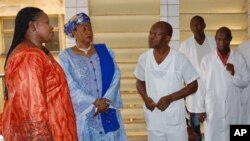The deputy prosecutor for the International Criminal Court is in Guinea to see if the court can try those responsible for killing opposition demonstrators last September. She says the ICC will only act if Guinea's own justice system fails to do so.
Deputy prosecutor Fatou Bensouda visited the national stadium where more than 150 people were killed and dozens of women raped last September during a protest against the expected presidential candidacy of Guinea's military ruler.
Bensouda says she is in Guinea to determine whether the violence that day amounted to crimes against humanity, and whether the International Criminal Court can try members of the military responsible for that violence if Guinea's own justice system does not.
"We are hoping to look into what the Guinean authorities are doing about it because the Guinean authorities have the primary responsibility of looking into the alleged crimes that fall within the jurisdiction of the ICC," she said.
Bensouda visited hospitals near the stadium and spoke with those responsible for trauma care, maternity wards, and the morgue. She also stopped at the army camp where military ruler Captain Moussa Dadis Camara was shot December 3rd by a former aid who accused the captain of trying to blame him for the September killing.
A United Nations inquiry says there are sufficient grounds for presuming that Captain Camara has direct criminal responsibility for the violence.
Captain Camara is in Burkina Faso where he is still recovering from his wounds. But he has agreed to a transitional government run by Defense Minister Sekouba Konate and civilian Prime Minister Jean-Marie Dore that is charged with organizing new elections by June.
Colonel Siba Loholamou is the transitional government's Justice Minister. Loholamou says the ICC's presence in Guinea is a sign of the country's willingness to cooperate with international justice. He says the transitional government will help Bensouda and her team in all its field work.
Bensouda's advance team says, so far, there has been good cooperation with Guinean authorities.
ICC Deputy Prosecutor in Guinea for September Killing Probe











